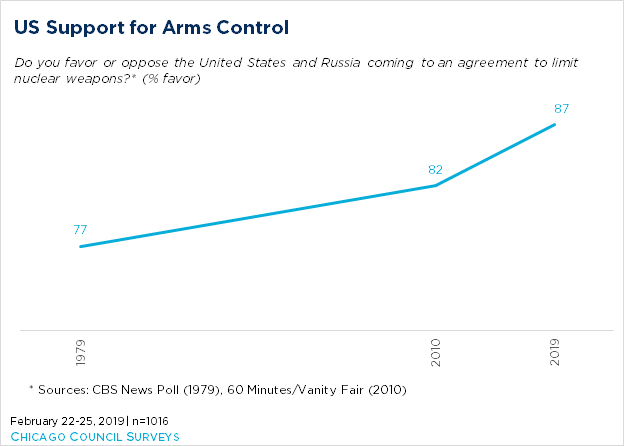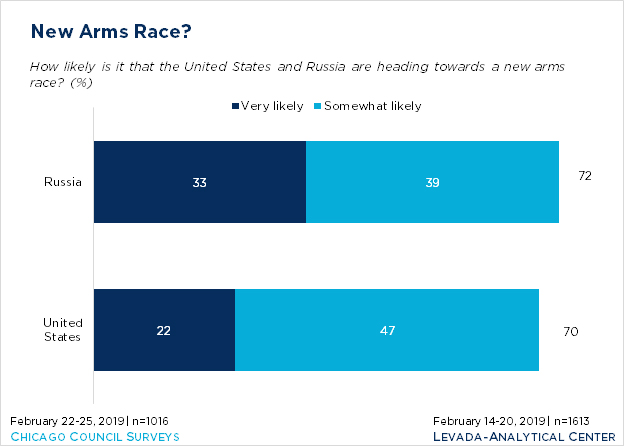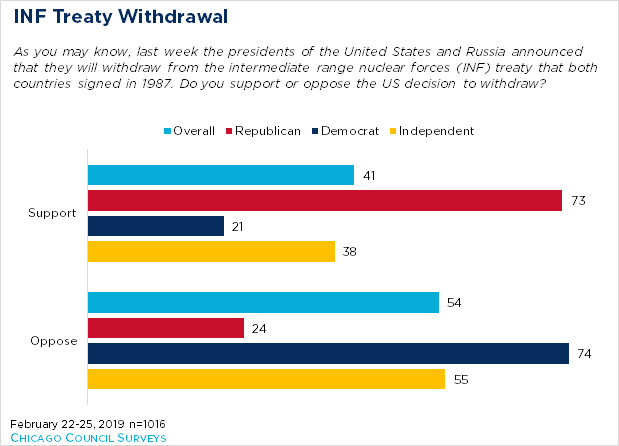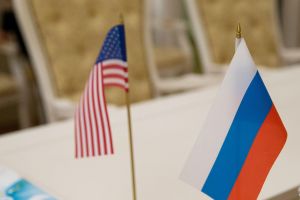Findings from a binational survey show that Americans and Russians would like to see the two countries negotiate a nuclear agreement.
Introduction
Findings from a new binational survey, conducted by the Chicago Council on Global Affairs and the Levada Analytical Center, show that Americans and Russians would like to see the two countries negotiate an agreement to reduce their nuclear arsenals
Key Findings
The United States and Russia are on track to withdraw from the Intermediate-Range Nuclear Forces (INF) Treaty in August. This leaves the New Strategic Arms Reduction Treaty (START) as the only remaining arms control agreement between the United States and Russia. However, New START is due to expire in 2021 and it appears unlikely that it will be extended. For the first time in decades, it is possible there will be no constraint on the quantity or quality of US and Russian nuclear forces.1
Findings from a new binational survey, conducted by the Chicago Council on Global Affairs and the Levada Analytical Center, show that Americans and Russians would like to see the two countries negotiate an agreement to reduce their nuclear arsenals.2 However, support or opposition to withdrawing from the INF Treaty is split amongst both the Russian and US publics.
Americans and Russians Want Arms Control
Despite the reticence of the US and Russian presidents to negotiate an extension or follow-on to New START, Americans and Russians would likely favor such an agreement. Nearly 9 in 10 Americans (87%) and 74 percent of Russians favor their two countries coming to an agreement to limit nuclear weapons. Historically, public support in the United States has been consistently high for arms control agreements between the two nuclear powers, which together at the height of the last arms race possessed an estimated 60,000 nuclear warheads out of a total estimated 64,000 nuclear warheads worldwide.3 In fact, even in a period of relative calm in 2007, majorities of both Russians and Americans favored cutting nuclear arsenals down to fewer than 400 active nuclear weapons each.4

Among Americans, support for negotiating arms control agreements is bipartisan (90% Republicans, 89% Democrats, 84% independents). This is notable along two lines, first that Republicans are not following President Trump’s cues on arms control in general—however, they are on the INF Treaty, see below. Second, while Democrats largely favor negotiating a new arms control agreement with Russia, they are far less likely to favor undertaking friendly cooperation and engagement with Russia in general (49% Republicans, 31% Democrats, 57% independents).
Such high levels of support for arms control currently are due, in part, to fears that the two countries are headed towards a new arms race—respondents who said a new arms race was likely were more likely to favor negotiating a new arms control agreement. American and Russian publics appear to agree with the many journalists speculating that the two countries are on that very path.5 Seven in 10 Americans and Russians think it is very (22% Americans, 33% Russians) or somewhat likely (47% Americans, 39% Russians) that the two countries are headed towards a new arms race.

Split Views on INF Treaty
However, when it comes to withdrawing from the INF Treaty, the Council and Levada surveys find both Russians and Americans are split. A slim majority of Americans oppose the US decision to withdraw from the agreement (41% support, 54% oppose). Like many foreign policy issues today, Americans are split along partisan lines, suggesting that support for the decision is linked to support for the US president.

Another survey—recently conducted by the Program for Public Consultation—found that after presenting Americans with arguments for and against withdrawing from the INF, a majority preferred to stay within the treaty and work with Russia to address both countries’ concerns (66%).6 What’s more, when given these arguments, majorities across all political parties favored remaining in the agreement (55% Republicans, 77% Democrats, 63% independents). This could indicate that Republicans’ gut feeling is to support the president’s decision, but when given additional information more are convinced by the arguments for remaining in the treaty.
Among Russians, a slim plurality support the Russian decision to withdraw from the INF Treaty (44% support, 40% oppose). Like the US findings, though to a lesser degree, Russians who support President Putin are more likely to favor withdrawal from the INF Treaty. A plurality of Russians (47%) who approve of the job Vladimir Putin is doing as president support Russia’s decision to withdraw from the agreement, while only 39 percent of Russians who do not approve of the job Putin is doing support the decision to withdraw.
Methodology
The analysis in this report is based on data from a joint Chicago Council-Levada Analytical Center survey on Russian and American Attitudes conducted in February 2019.
The US survey was conducted by Ipsos Public Affairs using their national online omnibus service, KnowledgePanel™, between February 22-24, 2019 among a weighted national sample of approximately 1,016 American adults, 18 years of age or older, living in all 50 US states and the District of Columbia. The margin of error is ±3 percentage points.
The Russia survey was conducted between February 14-20, 2019 by the Levada-Center (Levada Analytical Center) with face-to-face interviews conducted among a representative sample of 1,613 persons aged 18 years and older, living in eight federal districts of the Russian Federation. Inside each district, the sample is distributed among five strata of settlements proportionally to the number of population living in them, 18 years of age or older. The margin of error is ±3.4 percentage points.
- 1
Kingston Reif, "As INF Treaty Falls, New START Teeters," Arms Control Today, March 2019.
- 2
This brief is based on coordinated surveys conducted by Dina Smeltz and Lily Wojtowicz of the Chicago Council on Global Affairs and Denis Volkov and Stepan Goncharov of the Levada Analytical Center in Moscow. The joint project on US-Russian public opinion about foreign policy issues was generously funded by the Carnegie Corporation.
- 3
Hans M. Kristensen and Robert S. Norris, "Global Nuclear Weapons Inventories, 1945-2013," Bulletin of the Atomic Scientists, 69:5, 75-81.
- 4
After decades of cuts to both nuclear arsenals, a 2007 World Public Opinion survey found that majorities of Americans and Russians not only supported deeper cuts than those mandated by the recently negotiated Strategic Offensive Reductions Treaty (71% Americans, 58% Russians) but also favored cutting their nuclear arsenals to fewer than 400 active nuclear weapons each (59% Americans, 53% Russians).
- 5
For example, see: Ann M. Simmons and James Marson, "As US-Russia Treaty Breaks Down, Risk of Arms Race Rises," The Wall Street Journal, February 3 2019; "Is the US entering a new arms race with Russia," PBS Newshour, February 7 2019; Julian Borger, "Russian ambassador to the US warns arms control is 'in crisis'" The Guardian, March 4 2019.
- 6
These arguments can be found in this survey questionnaire.




